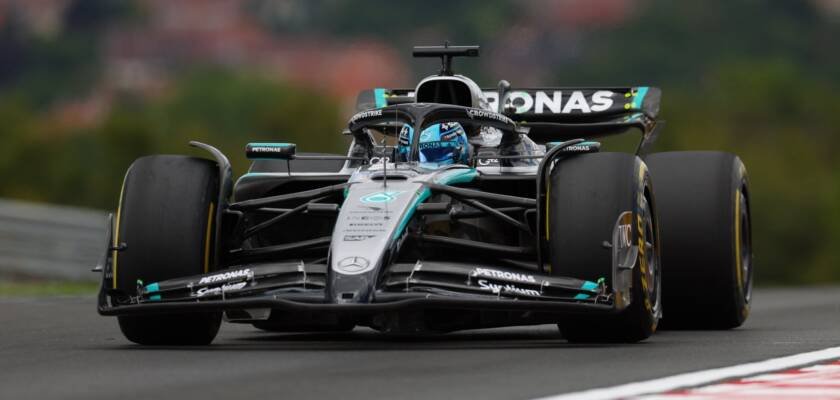The Future of Formula 1 Engines: Insights from Nigel Mansell
As Formula 1 gears up for a new era in 2026, the landscape of racing is set to dramatically shift with the introduction of new engine regulations. Nigel Mansell, a renowned figure in the world of motorsports and former F1 champion, has shared his thoughts on these impending changes. His insights reflect both optimism and concern regarding the future of the sport, particularly focusing on the balance between internal combustion engines and electric power.
A Shift Towards Electrification in Formula 1
The upcoming regulations set to take effect in 2026 will establish a significant transition in Formula 1. The sport is moving towards a 50-50 split between traditional internal combustion engines and electric power sources. This represents one of the most substantial steps towards electrification that the series has ever undertaken. Mansell has expressed both excitement and trepidation about these changes, indicating a transformative era for F1.
In a recent discussion, he acknowledged the unpredictability surrounding the new rules. "It’s an incredible question, and if you had a crystal ball, you could make a lot of money," he remarked, highlighting the uncertainty that comes with such significant regulatory shifts. The 2026 season promises to be a wild ride, with teams scrambling to adapt to the new requirements and find their footing in a rapidly evolving environment.
Mercedes: The Team to Watch
One of the most frequently mentioned teams in the context of the 2026 regulations is Mercedes. Mansell believes that the team is well-positioned to develop an impressive package that could capitalize on the new rules. Drawing on past performances, he noted that Mercedes had a strong grip on the sport during the turbo-hybrid era that began in 2014, which bears similarities to the upcoming regulations.
Mansell’s confidence in Mercedes as a frontrunner is echoed by many within the paddock. The team’s history of innovation and performance places them in a prime position to thrive under the new regulations. As they prepare for these changes, the question remains: can they replicate their past successes in this new landscape?
Aston Martin: A Rising Contender
Mansell also pointed to Aston Martin as a potential dark horse in the upcoming season. The team’s recent developments, particularly the recruitment of renowned designer Adrian Newey, could propel them into contention. Mansell stated, "They could start very strong," indicating that with the right design and execution, Aston Martin may surprise many in the 2026 season.
The entrance of Newey, known for his exceptional engineering prowess, could provide Aston Martin with the competitive edge needed to challenge established teams. As the team integrates his innovative strategies and designs, they may emerge as serious contenders in the quest for victory.
Technical Challenges Ahead
Transitioning to a 50-50 split between combustion and electric power presents numerous technical challenges for all teams. Mansell emphasized the complexity of this new setup, remarking, “The combustion engine will provide 50% of the power, and the electric component will contribute the other 50%. It’s a significant challenge — radical changes in a single year, as if there’s no tomorrow.”
These adaptations will require teams to rethink their engineering approaches and strategies. The balance between the two power sources will necessitate innovative designs that effectively harness the strengths of both types of engines. The ability to seamlessly integrate these technologies will likely determine which teams excel in the new era of Formula 1.
Ferrari: The Mystery Team
When discussing Ferrari, Mansell maintained an air of mystery. He acknowledged the team’s historical prowess in the sport, suggesting that if they manage to find the right formula, any team could dominate right from the start. "It’s fascinating. A little concerning, but fascinating," he added, hinting at the unpredictability that the new regulations might bring.
Ferrari has long been a powerhouse in Formula 1, and their ability to adapt to the new rules will be crucial. The team’s history of engineering excellence and competitive spirit positions them to potentially reclaim their status among the top teams, but whether they can effectively navigate the changes remains to be seen.
The Uncertain Road Ahead
As Formula 1 prepares for the 2026 season, the air is thick with anticipation and uncertainty. With the introduction of the new engine regulations, teams will face a steep learning curve as they adapt to the hybrid power requirements. Mansell’s reflections serve as a reminder of the challenges and opportunities that lie ahead.
The unpredictability of the upcoming season adds an exciting layer to the competition. Teams will need to be agile, innovative, and strategic in their approach to meet the demands of the new regulations. As they race towards 2026, all eyes will be on how well they can navigate this unprecedented shift in the sport.
Conclusion
The insights shared by Nigel Mansell regarding the future of Formula 1 engines highlight the complexities and possibilities that lie ahead. With significant changes on the horizon, teams will need to adapt quickly to stay competitive. As the sport embraces a new era of electrification, the excitement for the 2026 season continues to build. Fans and teams alike are eager to see how the landscape of Formula 1 will transform, and who will emerge victorious in this new chapter of racing history.
